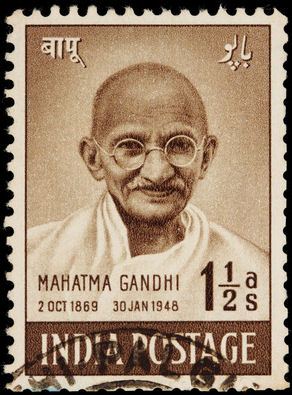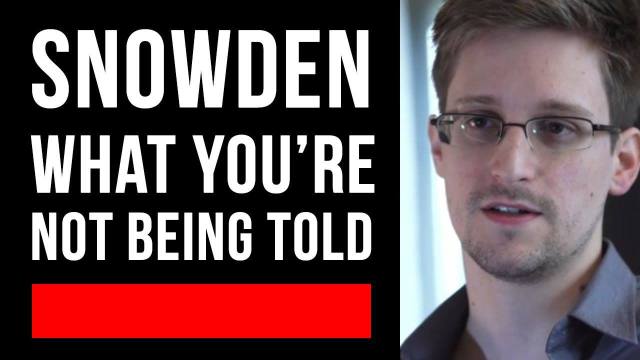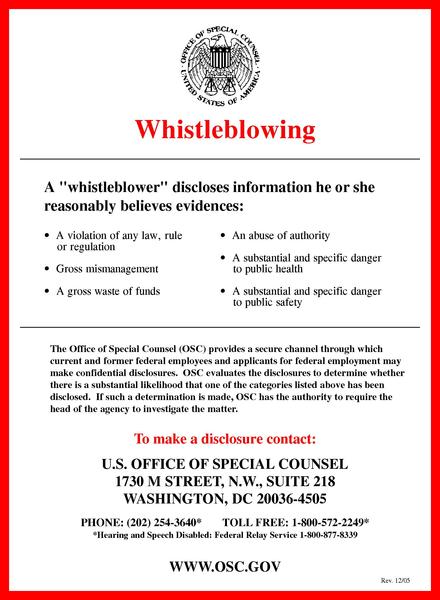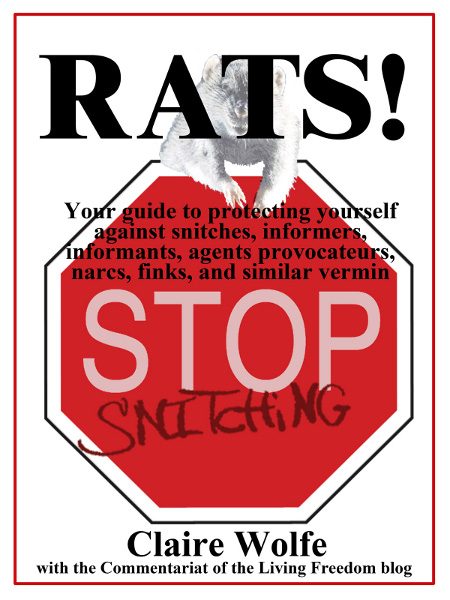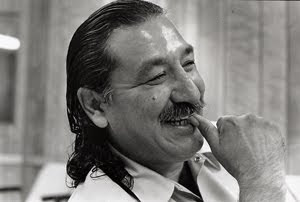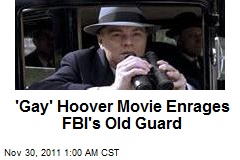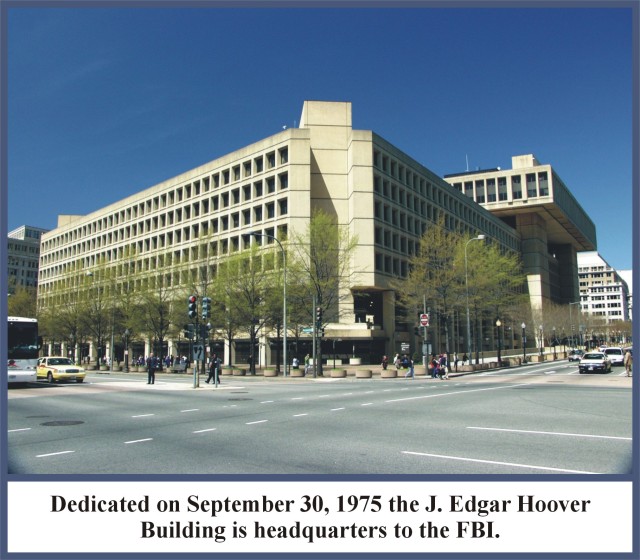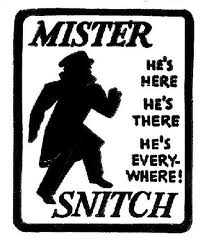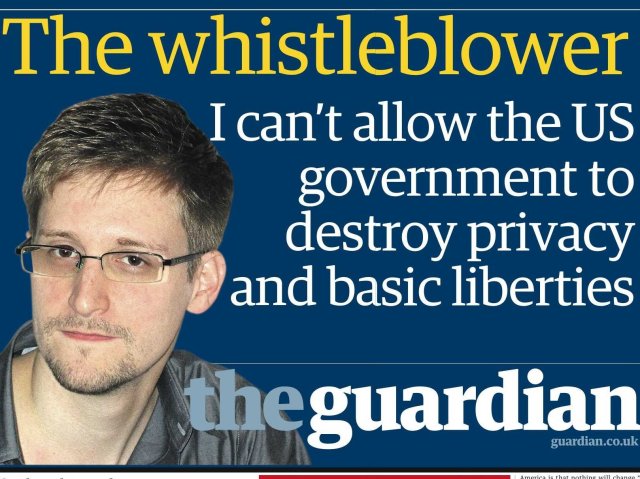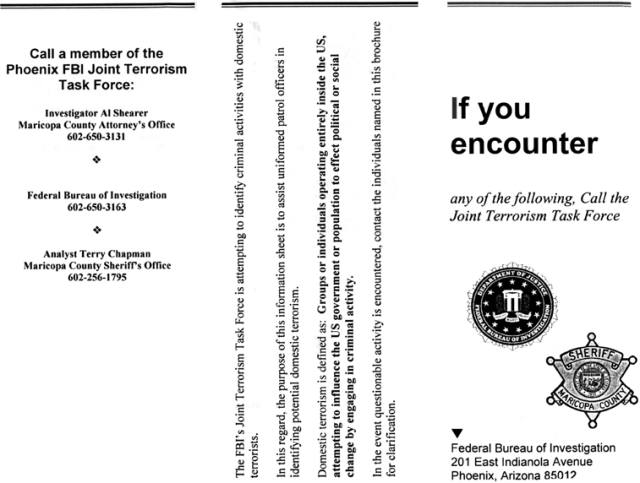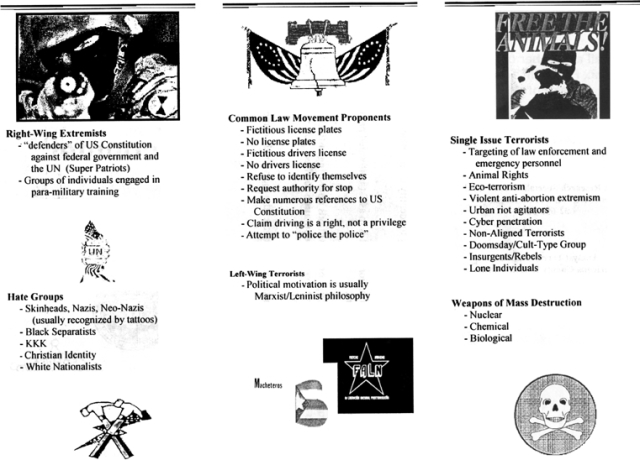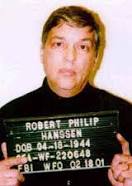Please also see:
ANOTHER NSA “WHISTLE-BLOWER”: THIS TIME A FORMER DIRECTOR OF NSA APPOINTED BY REAGAN
There are times when you have to obey a call which is the highest of all, i.e. the voice of conscience even though such obedience may cost many a bitter tear, and even more, separation from friends, from family, from the state, to which you may belong, from all that you have held as dear as life itself. For this obedience is the law of our being.
~ Mahatma Gandhi
A SINGLE SPARK CAN LIGHT A PRAIRIE FIRE – MAO ZEDONG
There are times when you have to obey a call which is the highest of all, i.e. the voice of conscience even though such obedience may cost many a bitter tear, and even more, separation from friends, from family, from the state, to which you may belong, from all that you have held as dear as life itself. For this obedience is the law of our being.
~ Mahatma Gandhi
Some have suggested that there is no real difference, or perhaps only a thin line between the whistle-blower and the snitch:
http://blogs.wsj.com/speakeasy/2013/06/17/the-thin-line-between-whistleblowing-and-snitching/
http://answers.yahoo.com/question/index?qid=20080902215613AAIUwZ4
http://www.whistleblower.org/blog/31/1224
http://www.fergusfallsjournal.com/2013/06/13/whistleblowers-snitches-or-hereos/
http://jamiebillingham.com/2012/08/on-snitching-whistleblowing-and-other-ethical-dilemmas/
https://en.wikipedia.org/wiki/Whistleblower
Why is it so many people refuse to believe that it is pure conscience driving Edward Snowden? Just a little more than a month ago he was living the “American Dream”: six-figure salary, living in Hawaii with an attractive girlfriend (and for those with excess levels of testosterone and sexist “Macho” a “Pole Dancer” no less) working in a highly sensitive position with overview of NSA and other intelligence agencies that few in NSA have access to and even more rare, as a high-school drop-out with a G.E.D. and no college; formerly employed with both CIA and NSA and trained in field trade-craft as well as on the analytic sides.
So what set Snowden off? How is any of what has transpired and will likely transpire possibly benefit him in the narrow terms of what is and what does it take to realize this mythical “American Dream”?
What differentiates Snowden as and suggeests he is “Whistle-blower” versus being a common “Snitch” or even garden-variety Traitor like Aldrich Ames of the CIA or Robert Hanssen of the FBI?
The Whistle-blower and/versus The “Snitch”
By Jim Craven/Omahkohkiaaiipooyii
There are times when you have to obey a call which is the highest of all, i.e. the voice of conscience even though such obedience may cost many a bitter tear, and even more, separation from friends, from family, from the state, to which you may belong, from all that you have held as dear as life itself. For this obedience is the law of our being.
~ Mahatma Gandhi
What is the difference if any, between a genuine whistle-blower and a genuine snitch? This is a serious question with many ramifications. This is especially so for radicals who may want to stop crime and harm to real people but who may regard any contact with law enforcement on any level as snitching and giving aid-and-comfort to a repressive State and its agents rather than whist
Why? Because IF a whistle-blower is in reality nothing but a glorified and reified snitch, or even if there is a narrow line between the whistle-blower and the snitch then certain social as well as individual consequences and constraints follow: How to we ever get rid of corruption and whose is going to do it? How does law enforcement ever enforce laws and catch criminals without a vigilant and caring public that pushes them to do their sworn duty without fear or favor? To whom then do those among the public who are being abused go for protection and judicial redress? Do they just become vigilantes as is so often celebrated in American culture? And given the typical social status and views by the majority of American society of the typical snitch [regarded in the worst of the prisons, with the worst of the criminals, as on or below the level of the child abuser] how can anyone, work in any way, no matter under what and how righteous the cause, with law enforcement or the courts without being considered a “snitch”?
So are there fundamental and defining differences between whistle-blowers and snitches and how will we know and document them? Let’s start with typical Motives (real and dressed-up).
TYPICAL MOTIVES OF WHISTLE-BLOWERS AND/VS SNITCHES:
In his play “The White Plague” one of Sean O’ Casey’s characters says: “Nothing is so passionate as a vested interest disguised as an intellectual conviction.” No doubt we all, as a matter of human nature, cognitive dissonance and our frailties, have the ability to justify to ourselves and others, as well as dress-up in finery, all sorts of higher reasons and motives for what we do—some of which may be actually quite base and off-base. So how can we know more about the likely true motives of anyone? How can we differentiate a genuine whistle-blower from a genuine snitch? Perhaps start with what they have to gain or lose respectively along with who is likely to win or lose with their information.
The basic premise I operate on is not that people are perfectly rational, or perfectly predictive or perfectly informed (I assume people are often highly irrational in terms of employing means and holding allegiances contradicting their own stated ends and goals; and I assume most cognition at the conscious level is influenced and shaped by subconscious and social forces) but that whether a whistle-blower or snitch, one has a good idea of what awaits in terms of possible costs and benefits; this is if only from the known experiences of previous whistle-blowers and snitches in and from the cultures in which the whistle-blowers and snitches operate.
CUI BONO: WHO BENEFITS AND WHO LOSES AND HOW?
Whistle-blowers typically have far more to lose than to gain; whereas snitches typically have far more to gain than to lose
Snitches often become snitches playing a version of “Prisoner’ Dilemma” in police interrogation: “Your buddy is in the next room singing like the Vienna Boys Choir. He puts you at the scene of the crime, doing the crime, while he was begging you to stop. I really don’t give a shit which one of you rolls on the other, but the one that rolls over first gets the light time for the crime we got you both on for sure slam dunk with no deals; and the other one who holds out, gets the full ride to and a lifetime stay in, a very nasty place where his views on the virtues of same-gender marriage and monogamy will likely change dramatically.”
Snitches typically come from cultures where the price of becoming known as a snitch may well be death or at least being totally ostracized. Yet they often hang out with their own kind who would also likely snitch in similar circumstances they believe. They typically demand and get anonymity for a time from their handlers, or may always remain anonymous and not have to testify in court, and demand a high price including ongoing protection if forced to come out in the open. Snitches do not want to confront, in the same room, eyeball-to-eyeball, those against whom they have made allegations with their allegations. Snitches want as little as possible in writing except to protect themselves. They and often their handlers rely on compartmentalization that makes cross-checking details of their stories and allegations more difficult and thus also potentially insulates them from civil as well as criminal actions by those against whom they snitched in the future. Their handlers often become protective of their snitches and treat them as a commodity and means of career advancement.
Snitches are not only informers whereas whistle-blowers are those who merely report what they believe to be crimes and deleterious practices for further investigations and application of law. If whistle-blowers are recruited to work sting operations later, they are no longer whistle-blowers but CIs or “Confidential Informants”. But genuine snitches do not just inform: They may act as provocateurs and lures in sting operations. They may act as infiltrators and CIs. They may act as agents of introduction or references in undercover operations and drug buys. They may act as lures to entice family members or friends on the run to come to where they can be apprehended. They may act as strike-breakers and union busters. They may act as management spies/proxies to file complaints against “colleagues” for those in the shadows and help to engineer what are unlawful and conspiratorial dismissals from employment under pretexts. They may engage in unlawful activities that law enforcement officers cannot in order to establish “creds” for themselves and others or to gather evidence in ways that law enforcement cannot or will not.
Those who handle snitches often have a vested interest in hiding the bad stuff on the snitch while hyping any exculpatory stuff (e.g. military experience, medals) to try to leverage against the potential lack of credibility and often nakedly mercenary motives and interests of the typical snitch. The snitch knows that it is in the interest of those for whom he is snitching to do all possible not to damage his credibility or go after him as long as he does not betray his masters. The whistle-blower on the other hand knows that his or her credibility is on the line will be publicly attacked in public venues and that little can be done if anything goes to court to shield the whistle-blower from a full examination of his or her whole life.
In the case of the typical snitch, the same basic motives (all self-centered) that cause people to betray any trust and colleagues or those they once called “friend”, to those they once swore were their enemies, motives that are used to corrupt and turn spies—summed-up in the acronym M.I.C.E.—often apply: Money; Ideology; Compromise; Ego. To that list one can add Revenge; Family-Tribal Ties; False Flag-Deception; Criminal Charges Dropped or Reduced; Pardon or Early Release; Citizenship and Green Cards; Immigration for Family;
But whistle-blowers before being outed, have typically approached higher level authorities and risked leaks and exposure. They often have shown a long and career-risky verbal and paper trail of concern about serious issues that if investigated may well bring down some existing power networks and even structures. They have often suffered previous attempts to silence them and take retribution against them under various pretexts. They often are not anonymous de facto even if shielded and protected de jure. And the powers-that-be usually know who blew the whistle from the questions being posed by investigators; while those being investigated can maintain the fiction that the whistle-blower was anonymous and was kept so to them.
Even the person who initially becomes a whistle-blower for some of the same more base reasons people become snitches—e.g. payback, love triangles, broken promises, etc.—has to provide law enforcement something real and credible: a complaint of actual potential criminal conduct, supportable with enough evidence of reasonable suspicion to justify a complaint moving forward and eventually an investigation of the complaint. That whistle-blower, especially if a public employee, is on the hook for all of his submissions and any attempt to use law enforcement for her own personal agenda, under the banner of something else, any fraudulent representations or misrepresentations, any perjury, any attempts to deceive or abuse judicial process, can bring heavy jail time for the whistle-blower along with a wide range of torts with extensive potential liability to those who claim being harmed with false accusations. Lying to law enforcement and attempting to use law enforcement to settle personal grudges or for personal agenda are heavy federal crimes and for good reason. Misuse of law enforcement for personal agenda take them away from where they are really needed and a serious form of corruption because corrupt judicial actions and verdicts become corrupt precedents that become like the slogan of “FTD Flowers” or “The Gift that keeps on giving” SEE FRONTLINE REAL CSI.
And even if the whistle-blower is absolutely righteous, even if her allegations are dead on and fully supported, the whistle-blower will still typically not be trusted (“am I next if I cross her?”) even by those who publicly praise the deed. The whistle-blower will still suffer being ostracized and marginalized, and will still have to fight alone (and by her courage expose the cowardice and opportunism of supposed “colleagues) against those taking reprisals for his or her whistle-blowing. More often than not, where the snitch has much more to gain than lose, the whistle-blower, even if totally justified and on very important issues, will suffer further not less marginalization, demonization and reprisals.
And if the whistle-blower is a public employee, he or she will typically be blowing the whistle on someone with the power to command and use public resources to: cover-up, reward with jobs and benefits the “colleague” snitches recruited against the whistle-blower; mount unlawful reprisals and dismissals of whistle-blowers under pretexts; defend in various courts the actions taken against the whistle-blowers; cover-up law enforcement being approached by and aided in turning a blind-eye to whistle-blowers; marginalize, blacklist, ostracize and demonize in the public arenas the whistle-blowers.
In the case of the snitch, they are typically in the position of being favored rather than punished, gaining all sorts of favors and special handling, with the uses of public resources commanded by others. They are often aided by those with access to relatively unlimited public resources arrayed against persons with limited or no means of response or reprisal. In the case of the snitch, he or she may get settlement and a new life in comfort he would have never been able to obtain without snitching. He may get murders forgiven and may get all sorts of new benefits for his family. The whistle-blower, on the other hand, typically has only worries for his or her family and his or her future employability or career at anything.
LEONARD PELTIER: A KIND OF WHISTLE-BLOWER BUT NO SNITCH
Leonard Peltier sits in prison accused of crimes he claims he is innocent of; a claim he had never backed away from. There is considerable evidence of serious denials of due process, perjury, falsification of evidence, prosecutorial misconduct and all sorts of other serial violations of the 14th and other Amendments of the U.S. Constitution. Throughout much of his life, Leonard Peltier “blew-the-whistle” on genocide, BIA and government corruption, Tribal corruption, murders and other crimes on the reservations and on poverty and neglect in Indian Country.
Leonard Peltier has always claimed he is innocent. Some claim that he knows who actually committed the murders or perhaps acts of self-defense that took the lives of two FBI Agents at Pine Ridge, but if so, he has refused to say so as he is no snitch and his only motive and benefit, for collaborating with law enforcement that framed him, and that openly demonstrates against his pardon [in violation of the 1939 Hatch Act prohibiting partisan demonstrations or lobbying by federal employees as federal employees], is that it would be for no other purpose than to save his own skin and compromise another and perhaps his or her family in doing so; that is snitching. Plus, if is not up to him to prove he is innocent but rather it is up to the state to prove he is guilty beyond a reasonable doubt and with full due process (which he never got) in accordance with the 14th Amendment of the U.S. Constitution. There is no need to frame, suborn perjury, manufacture and plant evidence in the case of a clearly guilty person—only an innocent or potentially innocent one.
And just because FBI says he is guilty does that make it so? This is the same FBI that recruited and produced the likes of Robert Hanssen. This is the same FBI founded and run by J Edgar Hoover, a hypocritical homophobe, a corrupt thug, a serial extortionist who serially shit all over the U.S. Constitution, ruined the lives of many innocents, and whose name adorns the FBI Headquarters Building in Washington, D.C. Having Hoover’s name on a building that is part of the so-called “Justice Department”, is like having a B’nai Brith building named after Heinrich Himmler or Reinhard Heyrich.
Apparently the new FBI still does DODT (Don’t Ask, Don’t Tell) when it comes to the legacy of homophobes and hypocrites “J.Edna” Hoover and Clyde Tolson.
The J Edgar Hoover Building. Imagine a shelter for battered women named after Ted Bundy. Imagine a building of the B’nai Brith named after Adolf Eichmann. That is what a building of the FBI and “Justice Department” named after a corrupt fascist thug, megalomaniac, extortionist of presidents, blackmailer and associate of mobsters is like. That this building is still named after Hoover after all the lives he destroyed also says where the FBI is still at today in terms of its culture.
I suspect that the reason the FBI has taken the unprecedented and illegal action of openly demonstrating and lobbying against the pardon of Leonard Peltier is that if he is pardoned rather than paroled (he will not be paroled as he must admit guilt which he never will) then they will have to reopen the case, look for the real killer or killers of the two FBI Special Agents (assuming it was not self-defense) and all sorts of FBI treachery and intrigue, some by former FBI still alive, will be exposed with potential criminal charges going in other directions. And in Leonard Peltier’s case the government definitely showed the difference between snitches and whistle-blowers as they have used often used real snitches against real whistle-blowers.
DILEMMAS OF THE WHISTLE-BLOWER AND/VERSUS THE SNITCH:
For the Snitch, there are few dilemmas and that relate to personal and narrow cost-benefit calculations”
If I snitch, how much will I be exposed and to whom at what levels?
Will my handlers keep their word and deal?
Is this deal the best I can get?
What lies can I get away with, what can I cover-up and still have a truth-only deal kept at least for my interests?
Will I be subject to reprisals, what kinds and by whom?
If I get a new life under witness protection will that new life be secure and better than the one I could get without all the risks and dangers of snitching?
Will my family or loved-ones (as much as any snitch can love anything beyond himself or herself) be protected also?
Will I be subject to civil and/or criminal actions as a result of my snitching and will they open-up all sorts of new “cans of worms”?
For the Whistle-blower, motivated by principle and perhaps distrustful of the system against which he or she is blowing the whistle there are some of the same but also different dilemmas:
How can I blow the whistle on corruption to a system fundamentally corrupt and to some of the very people in authority (or controlled by them) against whom I am blowing the whistle and perhaps themselves involved in some of the corruption or types of corruption I am blowing the whistle on?
What about my friends and colleagues who are not corrupt but perhaps do not have the guts or will to also blow the whistle, will they suffer reprisals just for being one of my friends? Why should anyone cross and ocean of threats and reprisals for those who would not jump a puddle for them?
What about my duty to my family and to feed them, how will I do so after the likely termination of employment and other reprisals following discovery of my whistle-blowing? How do I explain to my family that our lifestyle and perhaps even our life expectancies may be about to dramatically change?
If I keep quiet about corruption and intimidation where I work, am I not in reality “feeding my family” by taking away food and security from the families of others touched by my whistle-blowing especially the sacrificial lambs by those who really need to be taken out?
If I am of the belief that the State is not and never has been a “neutral referee” between contending social interests and classes, if I believe that the State is an organ of class rule, “The Executive Committee of the Bourgeoisie” as Karl Marx put it, if I believe that the State or elements of it are fundamentally corrupt themselves, if I believe that there is a high probability that nothing will be done and my complaint buried with certain reprisals against me and my family and friends, then why should any rational person go to law enforcement or the judiciary and if not, then where does one go and how does one alert the public to real crimes causing real harm to real people?
What if I am a public employee, mandated by law (the same law I assert for my own protection and that of loved ones) to report corruption:
Federal Crime Reporting Statute
The federal offense of failure to disclose a felony, if coupled with some act concealing the felony, such as suppression of evidence, harboring or protecting the person performing the felony, intimidation or harming a witness, or any other act designed to conceal from authorities the fact that a crime has been committed.
Title 18 U.S.C. § 4. Misprision of felony. Whoever, having knowledge of the actual commission of a felony cognizable by a court of the United States, conceals and does not as soon as possible make known the same to some judge or other person in civil or military authority under the United States, shall be fined under this title or imprisoned not more than three years, or both.
A federal judge, or any other government official, is required as part of the judge’s mandatory administrative duties, to receive any offer of information of a federal crime. If that judge blocks such report, that block is a felony under related obstruction of justice statutes, and constitutes a serious offense.
Upon receiving such information, the judge is then required to make it known to a government law enforcement body that is not themselves involved in the federal crime.
Another federal statute exists for reporting high-level corruption in government:
Title 28 U.S.C. § 1361. Action to compel an officer of the United States to perform his duty. The district courts shall have original jurisdiction of any action in the nature of mandamus to compel an officer or employee of the United States or any agency thereof to perform a duty owed to the plaintiff.
This federal statute permits any citizen to file a lawsuit in the federal courts to obtain a court order requiring a federal official to perform a mandatory duty and to halt unlawful acts. This statute is Title 28 U.S.C. § 1361.
and yet on the other hand I have seen all sorts of examples where Courts have simply refused to do their duty under law and have acted as instruments of rather than bulwarks against, obstruction and denial of justice:
These two statutes are among the most powerful tools in the hands of the people, even a single person, to report corrupt and criminal activities by federal officials−including federal judges−and to circumvent the blocks by those in key positions in the three branches of government. That statute was also repeatedly blocked by federal judges and Justices of the U.S. Supreme Court.
and further, I know some examples of the horrible costs of obstruction of justice, reprisals against whistle-blowers and failure to perform duties of a public employee see Rodney Stich case:
Top Government Personnel Repeatedly Violating Crime Reporting Statute
For over 40 years, former federal agent Rodney Stich has attempted to report the continuing corruption in the government’s aviation safety offices related to a series of continuing aviation disasters, and of criminal activities inflicting great harm upon the American people and upon the United States, to:
• Management in government aviation safety offices: FAA and NTSB and political board members.
• Members of Congress.
• Employees of the U.S. Department of Justice.
• Federal judges
• Supreme Court Justices.
• Media personnel with a duty to report major corruption of government personnel.
and to make it all weorse what if I am considered, falsely, as some kind of potential terrorist or criminal, and am under surveillance and/or likely to be ignored or suffer reprisals by the very law enforcement to which I am mandated to go to report corruption?
FBI MCSO Terrorist Flyer Front
FBI MCSOTerrorist Flyber Back
Is it not likely that I may well be prosecuted for “leaking” information or perspectives that have already been deliberately or not deliberately been revealed by others, perhaps in power and for their own agenda and who will never be prosecuted?
What about the whistle-blower who is a radical and the real deal motivated by real concern and caring for all oppressed victims on the one hand, and wants to stop real harm being done to real people, but on the other hand, fears that going to a law enforcement agency that in addition to being corrupt and agents of the rich few against the many may ignore or attempt to co-opt or leverage any complainants (to try to turn the whistle-blower into a snitch, to “turn” him or her, or to publicly paint him or her as one to destroy their credibility with other radicals and the general public–COINTELPRO)?
If I am a public employee, mandated by law (e.g. Misprision of a Felony; Obstruction of Justice; Misconduct of a Public Employee) to report what I have a good-faith-based and reasonable basis to believe are crimes going on causing real harm to real people, but yet I also believe that the State is fundamentally rotten and corrupt, and for my own reasons do not want to be anywhere near law enforcement I also believe to be corrupt and private-agenda-driven, how do I do my duty as a public employee, and as a human being trying to stop harm to innocents, yet not give other information or credibility to law enforcement I do not trust because of their own provable history of corruption and turning a selective blind-eye to it?
Whatever I feel about the law and legal system under capitalism, or perhaps about the generally corrupt, agenda-driven, incompetent, rabidly ideological nature of elements of law enforcement, the judicial system, the legislative system or the executive, along with the mainstream media, etc, how can I demand protection of the very same laws that I am either breaking or turning a blind eye to the breaking of?
If I see real harm being done to real people, to whom do I go and how do I stop it if I refuse to have anything to do with law enforcement or the legal system if and because I view them all as fundamentally corrupt, agents of a certain class most often doing the crimes rather than trying to stop them? Are then the victims whose victimization I could perhaps help to stop just “collateral damage” because I, in principle refuse to go anywhere near law enforcement for any reason?
MENS REA
MENS REA or mental state with respect to intent is critical in law. It is the difference between first-degree (premeditated) murder, second-degree murder, third-degree murder and manslaughter. Translated from Latin it literally means “Evil Mind”. How is Mens Rea established in law? Sometimes, snitches can provide direct evidence of intent to commit crime and awareness of which crimes one intends to commit from tapes and videos, stings, sworn and credible testimonies, or rolling-over insiders.
But more often than not, especially in conspiracy cases, it is fact patterns over time and space, it is social network connections and when and under what circumstances they occur, it is cover-ups (no need to cover-up what is clean only what is dirty), it is frame-ups (no need to frame the guilty only the innocent), it is perjury and piling-on (no need to lie if one’s case is clean only when it is dirty), it is questions to which answers are refused to be given or answered with lies, all that and more that reveal, when added up, to any average, reasonable and prudent person, not only that crimes are being committed, which ones and by whom, but also something about the mens rea behind them. They also reveal the mens rea and interests of both the snitches and the whistle-blowers.
In fact pattern and circumstantial evidence is often the most compelling to assess mens rea as well as giult as receipts, time stamps, public surveillance cameras, email exchanges and networks have no motives to lie and are not subject to ego, cognitive dissonance and bias or material interests. In the recent case of the murder (in my opinion) of Trayvon Martin, George Zimmerman, a self-appointed/anointed “Neighborhood Watch” Cop wannabe and Walter Mitty type, who had restraining orders against him and who had worked as an “under-the-table” security guard for house parties had called the police some 46 times over a one year period on “suspicious persons” all of whom, 100% were young and African American. That is an example of pattern evidence that should have been and was not admitted into evidence that not only showed racial bias along with a kind of “Dirty Harry” mentality, but that “Race” was all over the case.
There was pattern evidence of mens rea and proclivities of Zimmerman in hisemployment history , rejected application to be a cop, and dealings with others not even reported as “suspicious persons” as Zimmerman was fired as a security guard for allegedly being too aggressive and cop-wannabe-like. The supporters of Zimmerman say under law Zimmerman had a right to follow Trayvon Martin, had the legal right to ask him his intentions and had the legal right to get out of his car even when told not to by the police dispatcher.
But here is where we get into mens rea again. Zimmerman had no legal right to get out of his car with the intent to provoke a situation (remember Trayvon Martin also had a right to stand his ground and not have to flee a Dirty-Harry-wannabe) where he could play out his Walter Mitty fantasies and be a “ral man” and kill someone. Zimmerman had no legal right to follow anyone with ill intent–that is called stalking. Zimmerman had no authority to stop and detain Trayvon Martin of get into his space uninvited; that is called menacing. This shows only some of the sophistry of those who would white-wash (literally) this ill verdict and the evidence not allowed as well as allowed.
The old saying is “patterns are the shells of conspiracies.” They could have also added that patterns of behavior reveal not only character and intentions of a person, along with values, priorities and interests behind behavior, but also mens rea. The Soviet later Russian agent Robert Hanssen of the FBI, whose sophisticated trade-craft left the Russian SVR not knowing who they were handling and getting highly sensitive documents from, was finally identified many years later from a mantra that was his own special trademark and that was once recorded by the Russians from a connection with him. As he lectured his FBI subordinates who were taking weekends off because they did not see any operational movement on the part of Russian targets they had under surveillance, Hanssen told them that Russian trade-craft was to dry clean for four hours (do nothing and check for surveillance) and then go operational for a maximum of four hours and that they were well aware that FBI did not like to work weekends. Hanssen”s mantra was:
“Policies create constraints; constraints create patterns; and patterns can be noticed”.
That, mantra, heard on tape by an FBI Special Agent who was given that lecture by Hanssen, along with his fingerprints from a collection bag in the KGB archives, got him busted and a life sentence with no possibility of parole. Well what is the typical pattern of behavior of a whistle-blower and/versus that of a snitch? In the differences one can see also the differences in mens rea and motives as well as values held.
In the patterns of behaviors of typical snitches and how they approach or were approached by law enforcement, in how they are typically used by law enforcement and against whom, in what they seek and demand from law enforcement for their snitching, they all show fundamental differences in patterns versus the corresponding patterns of behavior of typical whistle-blowers.
And in those who refuse to differentiate The Snitch from The Whistle-blower, or in those who seek real snitches as whistle-blowers, or see real whistle-blowers as snitches, in those who immediately attribute, without evidence, base motives to apparent whistle-blowers like Snowden, or high motives to real snitches, they also, in their own patterns of behaviors, reveal something about their own motives, their own real mens rea as well as interests and associations guiding their perspectives.

